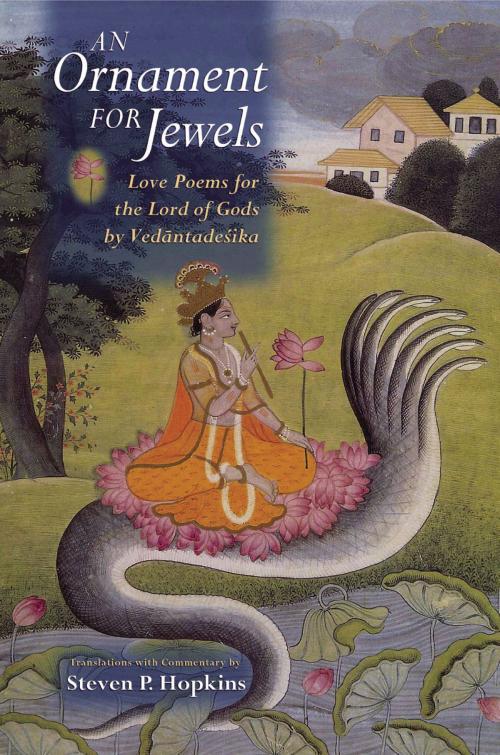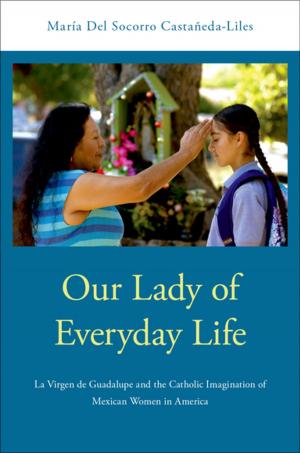An Ornament for Jewels
Love Poems For The Lord of Gods, by Vedantadesika
Nonfiction, Religion & Spirituality, Eastern Religions, Hinduism| Author: | Steven P. Hopkins | ISBN: | 9780190296094 |
| Publisher: | Oxford University Press | Publication: | October 18, 2007 |
| Imprint: | Oxford University Press | Language: | English |
| Author: | Steven P. Hopkins |
| ISBN: | 9780190296094 |
| Publisher: | Oxford University Press |
| Publication: | October 18, 2007 |
| Imprint: | Oxford University Press |
| Language: | English |
In this companion volume to Singing the Body of God (Oxford 2002), Steven P. Hopkins has translated into contemporary American English verse poems written by the South Indian Srivaisnava philosopher and saint-poet Venkatesa (c. 1268-1369). These poems, in three different languages - Sanskrit, Tamil, and Maharastri Prakrit -- composed for one particular Hindu god, Vishnu Devanayaka, the "Lord of Gods" at Tiruvahindrapuram, form a microcosm of the saint-poet's work. They encompass major themes of Venkatesa's devotional poetics, from the play of divine absence and presence in the world of religious emotions; the "telescoping" of time past and future in the eternal "present" of the poem; love, human vulnerability and the impassible perfected body of god; to the devotional experience of a "beauty that saves" and to what Hopkins terms the paradoxical coexistence of asymmetry and intimacy of lover and beloved at the heart of the divine-human encounter. Moreover, these poems form not only a thematic microcosm, but a linguistic one embracing all three of the poet's working languages. Like the remembered world of Proust's Combray in the taste of madeleine dipped in tea, or Blake's World in a Grain of Sand, we taste and see, in this one particular place, and in this one particular form of Vishnu, various protean forms and powers of the divine, and trace a veritable summa of theological, philosophical, and literary designs. Each translated poem forms a chapter in itself, has its own individual short Afterword, along with detailed linguistic and thematic notes and commentary. The volume concludes, for comparative reasons, with a translation of Tirumankaiyalvar's luminous cycle of verses for Devanayaka from the Periyatirumoli. As much an argument as an anthology, this book will be of interest to students and scholars of South Asian studies, comparative religion, and Indian literatures.
In this companion volume to Singing the Body of God (Oxford 2002), Steven P. Hopkins has translated into contemporary American English verse poems written by the South Indian Srivaisnava philosopher and saint-poet Venkatesa (c. 1268-1369). These poems, in three different languages - Sanskrit, Tamil, and Maharastri Prakrit -- composed for one particular Hindu god, Vishnu Devanayaka, the "Lord of Gods" at Tiruvahindrapuram, form a microcosm of the saint-poet's work. They encompass major themes of Venkatesa's devotional poetics, from the play of divine absence and presence in the world of religious emotions; the "telescoping" of time past and future in the eternal "present" of the poem; love, human vulnerability and the impassible perfected body of god; to the devotional experience of a "beauty that saves" and to what Hopkins terms the paradoxical coexistence of asymmetry and intimacy of lover and beloved at the heart of the divine-human encounter. Moreover, these poems form not only a thematic microcosm, but a linguistic one embracing all three of the poet's working languages. Like the remembered world of Proust's Combray in the taste of madeleine dipped in tea, or Blake's World in a Grain of Sand, we taste and see, in this one particular place, and in this one particular form of Vishnu, various protean forms and powers of the divine, and trace a veritable summa of theological, philosophical, and literary designs. Each translated poem forms a chapter in itself, has its own individual short Afterword, along with detailed linguistic and thematic notes and commentary. The volume concludes, for comparative reasons, with a translation of Tirumankaiyalvar's luminous cycle of verses for Devanayaka from the Periyatirumoli. As much an argument as an anthology, this book will be of interest to students and scholars of South Asian studies, comparative religion, and Indian literatures.















